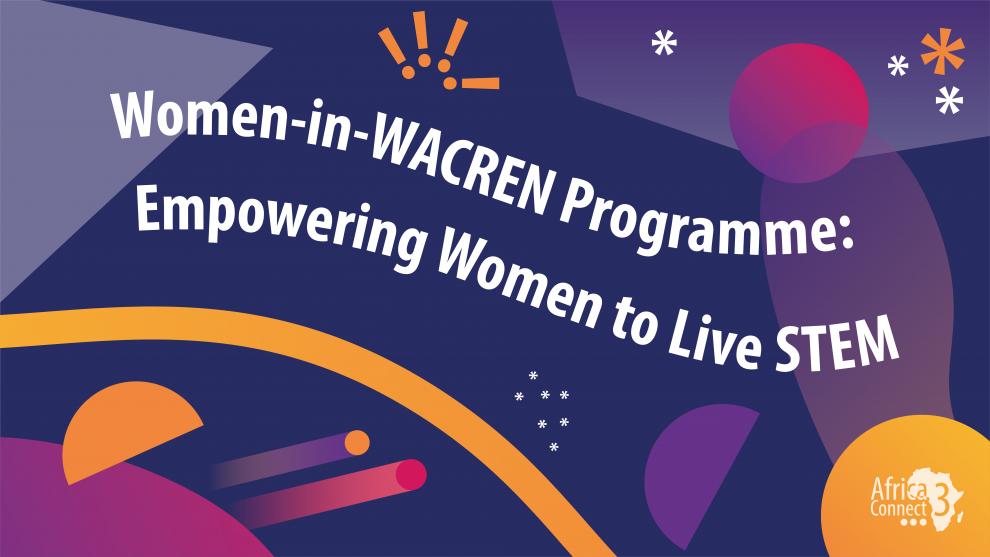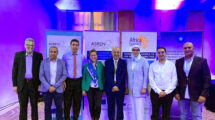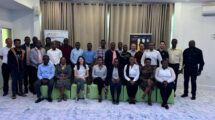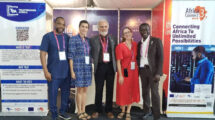Words: Effah Amponsah
The AC3 #womeninSTEM campaign now puts the spotlight on the West and Central African Research and Education Network (WACREN), to find out how the regional REN is helping to turn women’s passion into when it comes to STEM.
They are usually outnumbered in the tech classrooms and workplaces; culturally disadvantaged and stereotyped; most often than not, they are left to chart their own courses in life.
This is often the story of most women, who have the zest for science, innovation and technology, in many parts of the world including Africa.
A string of factors, put together, usually pigeonholes women, limits their potentials and further widens the gender inequality in STEM. According to UNESCO Institute of Statistics (UIS), “to truly reduce the gender gap, we must go beyond the hard numbers and identify the qualitative factors that deter women from pursuing careers in science, technology, engineering and mathematics (STEM).”
Despite the steady progress towards changing the status quo, tech still appears to be a man’s world, in many parts of the world.
Narrow that down to Africa, the case is not any different; bring it to the research and education network (REN) space – same case. The quest to fix the gender equality and representation imbalance has been driving WACREN towards making investments in young women at this side of the continent.
Close to four years now, the regional REN, through its novel Women-In-WACREN (WiW) programme, has been empowering women across the region and beyond to say a resounding ‘yes’ to the science, technology, engineering and math (STEM) fields of endeavor.
Anchored on the values of diversity, inclusion and collaboration, WACREN is keeping women’s hopes alive in STEM across Africa. The aim of the programme is to educate, equip and empower women with the relevant skills and confidence to survive and thrive in the clearly male-dominated STEM field.
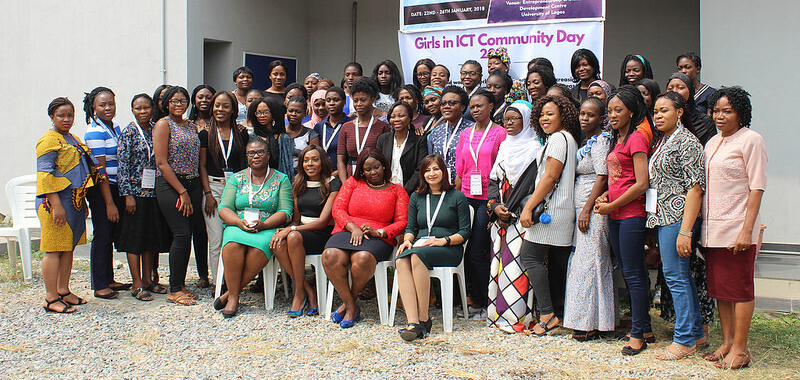
In 2018, WACREN launched the maiden WiW five-day workshop where top-notch technologists shared knowledge and experience on basic programming (Python), application of Git and DevOps and introduction to embedded systems (Raspberry Pi) and sensors.
Now in its fourth year, the WiW programme has been making innovators, and tech entrepreneurs out of women. As little drops of water, the programme is making a mighty ocean of women who are braving the storms of cultural stereotyping to be the best version of themselves. In between the inception and now, the programme has, directly and indirectly, touched the lives of over 2000 young women in the WACREN region and beyond.
The WiW program comprises two main activities: an online course and a hackathon event. The online course was created in collaboration with Eko-Konnect (the NREN of Nigeria) and volunteers from the University Cape Coast in Ghana. The online course targets women with passion, with or without prior knowledge in computing or tech.
This free course: ‘Physical Computing with Python’ introduces participants to fundamentals of sensor interaction with the physical world and programming. It runs for 10 weeks annually. Participants receive training on introduction to Linux Command Line Interface, Python Programming, DevOps Lifecycle and Git and Embedded Systems, Sensors, and other common electronic components.
Successful participants are usually selected to partake in in-person Hackathons where they apply knowledge gained in building prototypes of real-life smart devices and overall acquire coding, problem-solving and hardware skills. It’s exciting to say that over 300 females from across Africa have participated and 150 certificates of completion have been issued.
The course is built on interactive, visual and collaborative learning experience through community discussion forums, video conferencing, webinars and group projects. To attract wider participation across Africa, WACREN is planning to make the WiW programme activities multilingual.
Following the 2019 online course, a five-day WiW Hackathon event was hosted by Eko-Konnect and held at the Covenant University in Nigeria.
Selected participants engaged in building interactive real-life prototype physical computing projects using low-cost sensors and embedded devices.
During the pilot hackathon, the participants built a Data-Logging IoT Weather Station. The prototype project was further deployed on some institutions premises to create an NREN Weather Map where weather data collected across different locations can be stored, analysed and visualised on a single internet of things (IoT) platform.
Eletta Adeola, a Nigerian participant and co-innovator of the weather station expressed excitement on the completion project: “Amazing experience at the women in WACREN Hackfest2019. We set up a weather station. Despite the challenges, we configured the raspberry pi, got the wind speed of our anemometer working. Thanks to Eko-Konnect, WACREN, AfricaConnect2…” Her project teammates described the experience as impactful, educative and brain-tasking.

Talking to AC3 Communication, WACREN CEO – Dr. Boubakar Barry hopes to see a day when this programme will become a continental pursuit – what has been called Women-in-AfREN by some quarters.
According to Dr. Barry, WACREN will continue to harness its capacities to empower and offer opportunities to women who have passion for STEM. The regional REN will continue to contribute to the achieving of the Goal 5 of the UN Sustainable Development Goals (SDGs) – ‘to achieve gender equality and empower women and girls’.
Looking into the future, WACREN is open for partnerships with regional and national RENs across Africa, women group activists, international donors, governmental agencies and regional bodies; partnerships to scale up the programme to ensure that relevant investments are made in young women and girls to make their potentials become useful. We have to tackle it as an African community so as to drive sustainable change of status quo when it comes to women in STEM and create the necessary impact.

